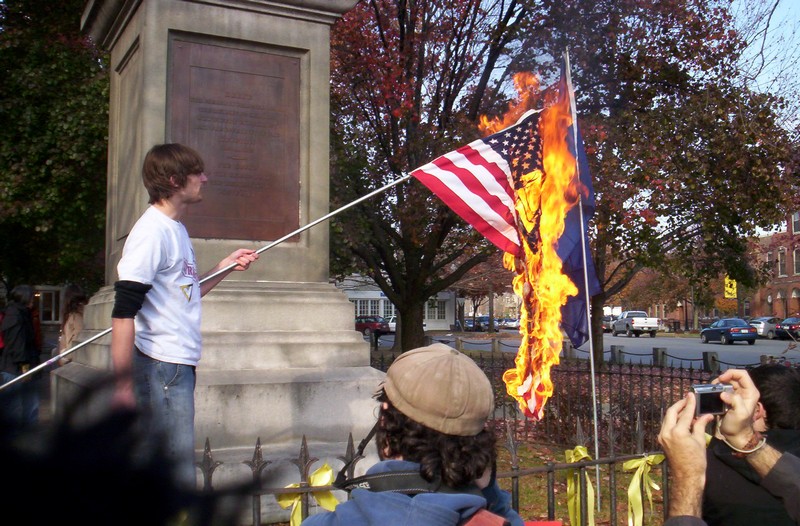
Burning the American Flag: A Symbol of Free Speech or a Desecration of Honor?
The American flag, a timeless and revered symbol of unity, freedom, and sacrifice, has long been held in the highest regard by citizens and foreigners alike. However, the act of burning the flag, whether as a form of protest or artistic expression, has sparked heated debates and legal challenges over the years.
Constitutional Protection of Flag Burning
The First Amendment to the United States Constitution guarantees the freedom of speech, which includes the right to express oneself through symbolic actions such as flag burning. In the landmark 1989 case of Texas v. Johnson, the Supreme Court ruled that flag burning is a protected form of speech, even if it is considered offensive or disrespectful by many.
The Court held that the government cannot prohibit the burning of the flag because it is a form of symbolic speech that expresses a political message. The Court recognized that flag burning is a controversial act that may be deeply offensive to some, but it nevertheless falls within the realm of protected speech.
Arguments in Favor of Flag Burning
Proponents of flag burning argue that it is a legitimate form of political protest and artistic expression. They contend that burning the flag is a powerful way to convey a message of dissent, outrage, or frustration with the government or certain policies.
Some argue that flag burning is a necessary form of protest, especially when other forms of expression are ineffective or silenced. They believe that burning the flag can be a symbolic act of resistance against injustice and oppression.
Arguments Against Flag Burning
Opponents of flag burning vehemently argue that it is a desecration of a sacred symbol and an insult to those who have fought and died for the country. They believe that burning the flag is a disrespectful and offensive act that shows contempt for the nation and its values.
Many argue that flag burning should not be considered free speech but rather a form of vandalism or destruction of property. They believe that the government has a legitimate interest in protecting the flag from intentional acts of harm.
Legal Challenges and Controversies
Following the Supreme Court’s ruling in Texas v. Johnson, several states enacted laws that criminalized flag burning. However, these laws were later struck down by the courts as unconstitutional.
In 1990, the Supreme Court upheld a lower court ruling that the burning of the flag in a protest against President George H.W. Bush’s policies was protected by the First Amendment. In United States v. Eichman, the Court reaffirmed the principle that flag burning is a form of symbolic speech that is protected by the Constitution.
Despite these legal rulings, flag burning remains a controversial act that often sparks public outrage and protests. In some cases, flag burning has led to violence and arrests.
Public Opinion and Social Norms
Public opinion on flag burning is deeply divided. According to a 2017 Gallup poll, 68% of Americans believe that flag burning should be illegal, while 29% believe it should be legal.
Flag burning is generally considered to be a disrespectful and offensive act by the majority of Americans. It is often seen as a symbol of disloyalty, disrespect, or hatred towards the country.
Alternative Forms of Protest
There are many other ways to express one’s political views or engage in protest without resorting to flag burning. Alternative forms of protest include:
- Peaceful demonstrations: Organizing marches, rallies, or sit-ins to convey a message and raise awareness.
- Boycotts and divestment: Withholding support for businesses or institutions that do not align with one’s values.
- Civil disobedience: Nonviolent actions that break the law in order to draw attention to an injustice or demand change.
- Artistic expression: Using painting, sculpture, music, or other forms of art to create works that critique or expose social issues.
Conclusion
The debate over flag burning is likely to continue for many years to come. While it is a controversial and offensive act to many, it is also a protected form of speech under the First Amendment. Those who engage in flag burning must be aware of the potential for public backlash and legal consequences, but they also have the right to express their political views in this way.
It is important to engage in respectful and informed discussions about flag burning and other forms of symbolic speech. By understanding the arguments on both sides, we can foster a society that balances freedom of expression with respect for our national symbols and values.
FAQ
Q: Is flag burning illegal in the United States?
A: No, flag burning is protected by the First Amendment to the U.S. Constitution.
Q: Why did the Supreme Court rule that flag burning is protected speech?
A: The Court held that flag burning is a form of symbolic speech that expresses a political message and that the government cannot prohibit it because it is offensive to some people.
Q: Are there any exceptions to the rule that flag burning is protected speech?
A: Yes, flag burning may not be protected if it is done in a way that incites imminent violence or poses a clear and present danger to public safety.
Q: What are alternative forms of protest to flag burning?
A: Alternative forms of protest include peaceful demonstrations, boycotts, civil disobedience, and artistic expression.
Q: How can we engage in respectful discussions about flag burning?
A: By understanding the arguments on both sides, acknowledging the differing perspectives, and focusing on the underlying issues and values.
References
- Texas v. Johnson, 491 U.S. 397 (1989)
- United States v. Eichman, 496 U.S. 310 (1990)
- Gallup poll: https://news.gallup.com/poll/1633/patriotism.aspx





